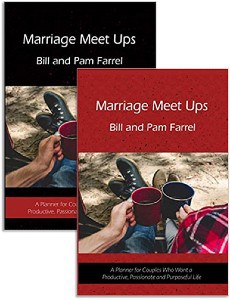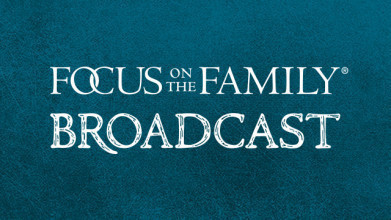
The War of Words
In this Adventures in Odyssey drama, a carelessly uttered word from Eugene creates havoc as it becomes the fashionable insult, resulting in a lesson about the power of words.
Home » Episodes » Focus on the Family Broadcast » Strengthen Your Marriage With a Meet Up
Preview
Bill Farrel: Pam, I asked a question several years ago, like, “What has really made our relationship work?” ‘Cause it’s easy to talk about theory, and, like…
Jim Daly: Yeah, this is good.
Bill: … but, like, what really made it work? And what we came up with was, we decided early on to be tough on ourselves, and tender on each other.
End of Preview
John Fuller: That’s Bill Farrel joining us today on Focus on the Family, along with his wife, Pam, and I’m John Fuller. Your host is Focus on the Family President, and author, Jim Daly.
Jim: John, you, and I both know people that have hit that wall, just a few months, or years, into their marriage. It just becomes a place that they’re not as happy as they thought they would be. Some couples are facing that intense conflict right now, and if that’s where you’re at, we want to help. Focus is here for ya’, so, please, get in touch with us. We have so many great resources, including a marriage intensive. It’s four days typically, and you spend about 38, 40 hours workin’ on your marriage. It’s one of the best things that we have going here at Focus. It has a post two-year survey of 80% of those couples still married and doing better, so I’m proud of that, and I will continue to talk about it from time to time.
Oftentimes, husbands and wives, they just feel so disillusioned, because their marital experience has not met their expectations, and today, we’re gonna talk with a wonderful couple about how to really do marriage so much better.
John: Yeah, they’ve been married for over 40 years. Bill and Pam Farrel have been here a number of times. They always get a great response from our listeners, and we’re going to be talking about one of their books called Marriage Meetups: A Planner for Couples Who Want a Productive, Passionate, and Purposeful Life, and you can stop by focusonthefamily.com/broadcast, or call 1-800, the letter A and the word FAMILY to learn more.
Jim: Bill and Pam, welcome back to Focus.
Pam Farrel: Ah, it’s so good to be here. Yay.
Jim: (laughs) I love your enthusiasm.
Pam: (laughs)
Bill: Isn’t it fun?
Pam: We missed y’all.
Jim: It is fun. Well, let me ask Bill. Is that fun? (laughs)
Bill: Yeah, and it’s genuine. Like I told Pam earlier in our marriage, “You cannot drink coffee, because you came when you were pre caffeinated.”
Jim: That is very true.
Bill: Yep. Yep.
Jim: Pam was loaded with energy. Okay, so earlier this morning, I was gettin’ ready for the show, and I was reading the prep, and Jean sat down to have a cup of coffee with me, and…
Pam: That’s nice.
Jim: … she was saying, you know, I kind of explained the concept of marriage meetups, and she said, “Oh, I like that,” and I was like, “Really?” (laughs) See, today your chore is to win me over.
Pam: Awesome.
Jim: But my wife, she loves the idea. She said, “We should do this.”
Pam: Amen.
Jim: So, I think we’re gonna…
Pam: She’s my new best friend. (laughs)
Jim: …we’re gonna be starting to do the marriage meetup weekly.
John: You mean we’re Jean’s advocates today?
Jim: Absolutely. This is…
John: This is an intervention.
Jim: …this is the beat down of Jim Daly. But, you know, frankly, that’s what’s funny. I mean, I think typically opposites marry.
Pam: They do.
Jim: Not always, and I get that, but I think in this area, Jean really connected with the concept of having a weekly marriage meetup, and talking things over, and I was like, “I’ve got so many meetings. That’s not a meeting I want to have,” and that’s probably something you encounter all the time, right?
Pam: Oh, it is. But hey, it’s got some upsides to this meeting that probably your other meetings do not have. Yeah.
Jim: (laughs) That is well said. Invest wisely.
Bill: And you know, John, in your introduction, you mentioned we’ve been married over 40 years. Which seems kind of impossible. Like, it gets here so fast, but we didn’t write this book early, even though we’ve been doing this our whole marriage.
Pam: Right.
Bill: Because…
Jim: Well, that’s good.
Bill: … the reaction we get is, “Really? This is that much work?” Like…
Pam: It’s like homework.
Bill: …like, really?
Jim: I feel so stupid right now. (laughs)
Bill: And we, you know, we’ve been asking ourselves, “Okay, how do we do this in a way that people can relate to,” because when you say, “Hey, you should have a business meeting with your partner.” They’re like, “No, I do those. I have plenty of those. I don’t want to do that with my spouse.” And when the whole COVID shutdown hit, you know, and everybody was just home, we thought, this is a good time to get this written.
Pam: Yeah.
Jim: Yeah, so I mean, you guys have been practicing this for a long time.
Pam: 42 years.
Bill: Yeah, and the reason why I think people resist it is the big disruptor of intimacy is responsibility. So, when you get married, and you’re first at it, your responsibility is often the marriage. And you’re just focused on each other, and then every year adds more responsibility.
Pam: Yeah.
Bill: And pretty soon, it gets in the way of intimacy.
Jim: You know, I relate to Jean’s enthusiasm. It’s, like, for her, it’s a solution to something she’s, you know, wanting. Let’s clarify some of these things, et cetera. Well, let’s get into it. How did the meetups, the marriage meetups, help you two with conflict and disagreements over parenting? Let’s go right to the jugular.
Pam: Right? Yeah. I’m glad that we started doing a marriage meetup before we were parents, because even some of our discussions, we call it our Monday morning marriage meeting. That’s what we called it early on.
Jim: And you do it on Monday, no less.
Pam: Yeah, because…
Jim: Okay, you’re really winning me over here.
Pam: …I know. Bill was a Pastor, so Monday was our day off.
Jim: Okay. All right.
Pam: So, that’s why it landed there.
Jim: Yeah.
Pam: He was a youth pastor when we first started. So, some of our conversations were even about, like, when do we want to have kids. How many? So, sometimes you tackle some big issues, and sometimes, it’s the little annoying issues that you tackle in…
Jim: Oh, give us one of those.
Pam: … the meet ups.
Bill: Let me give you specific examples.
Jim: Yeah.
Pam: Yeah.
Bill: So, Pam and Zachary have this, like, connection to each other, ’cause they just get one another. Zachary has a completely different personality from me. So, I have to learn about Zach. I don’t instinctively get him. So, he’s in high school, and we decide he needs to get a vehicle before he leaves to college. But for me, getting a vehicle’s a very practical discussion.
Jim: Sure.
Bill: Like, we need to find something that’s practical, something that’s reliable, something that will suit his needs, but Pam and Zachary have an emotional connection to this vehicle.
Pam: Right, Zach wants a…
Jim: (laughs) A particular one.
Pam: …yeah. Lifted truck, you know? With big wheels. Totally impractical, but it expresses himself.
Bill: So, I come to the meeting and I’m thinking, “We have to have a budget for this…”
Jim: Yeah.
Bill: “…this purchase. We have to have reasons why it’s a good vehicle, and it needs to be relatively economical.” Those are not the reasons that Pam is bringing to the meeting.
Jim: That sounds like a Honda or a Toyota to me.
Pam: (laughs) Right, which our third son did drive.
Jim: (laughs) That’s right.
Bill: And the first time Pam said to me, “We need to get him a truck, or he’s gonna be mad for years.”
Jim: Oh, now the leverage.
Bill: And I’m like, “Who cares if he’s mad?”
Jim: That may be a good thing.
Pam: It’s his person. It’s, like, how he expresses himself, and, you know, he wants to make a statement. He lives big.
Jim: Okay.
Pam: He ended up getting a, you know, scholarship.
Bill: So, sitting in this meeting goin’, “I trust Pam, and I know Pam understands Zach better than I do, but I don’t like her reasoning.”
Jim: (laughs) I love this honesty.
Pam: But, you know, so we had that space that was set there, and we could take our time over a few weeks to make that decision…
Jim: Yeah.
Pam: …and so we decided we did need to bring Zach into this, and he did need to have a budget, and et cetera. So, if he could find what he wanted under the budget that dad said, “Yay, you could have your lifted truck,” and that’s exactly what happened, because Bill is very practical, and my husband can find, like, a deal. He just found, like, a free jacuzzi on Craigslist and put it in his parents’ backyard. So, when we’re over caregiving, we have a little spa…
Jim: Oh, my goodness.
Pam: …I mean, yeah. So, he’s really good.
Jim: That is pretty good.
Pam: He’s a deal finder. So, we got Bill on board, and Zach did get that lifted truck, which, you know, for a guy who’s, like, the captain of the cheer team at University of Louisville, that’s the kind of statement you want to make. I’m, you know, I’m a man’s man, I can, like, throw girls and raise them over my head on national TV. (laughs) Just, like, larger than life.
Jim: Has he ever dropped anybody?
Pam: He’s never dropped anybody ever, ever, ever.
Jim: (laughs) I’m just always curious about that.
Pam: And he just transitioned out of 10 years being a strength coach at University of Louisville.
Jim: Oh, that’s great.
Pam: And, you know, (laughs) I went out. He did a back flip, and then led the crowd in CARD, cards, you know?
Jim: That is the benefit of that.
Pam: (laughs) Yeah.
Jim: Let’s talk about the three components of marriage meetings.
Pam: And he still drives a truck.
Jim: (laughs) A lifted truck, no less.
Pam: He does.
Jim: What are the three components.
Bill: So, the first one, which I actually think is the most important one, is affirmation, because…
Jim: Okay, makes sense.
Bill: … this meeting has to be different than every other meeting you have. Like, when you go into a business meeting with business partners, you’re not worried about the emotional climate of your relationship. You’re not worried about when we’re done with this meeting, are we gonna like each other enough that we would like to make love to one another. Like, those don’t come up in business, hopefully, but in your marriage…
Jim: Right. (laughs)
Bill: … (laugh) in your marriage, those things are vital.
Jim: Yeah, absolutely.
Bill: Like, one of the things I learned early is I have to set a tone with Pam that says, “The only reason I’m having this meeting with you is ’cause I love you enough to connect my whole life to you.” So, the affirmation in this meeting starts with a prayer with one another, and a compliment.
Pam: Yeah.
Bill: So, either something I love about you that I’ve seen this week, or a reminder of why I married you, so it sets the tone that I’m glad to be here because of who you are.
Pam: Right.
Jim: That’s a beautiful example. That’s affirmation. What’s the other two? Habits?
Bill: So, the H is habits.
Pam: Yep.
Bill: ‘Cause if you’re gonna organize your life, you have to develop habits. Like, doing your budget. It’s not an inspirational activity in life. Coordinating your calendar for the week is not an inspirational kind of a thing. Identifying what projects you have to finish this week as a couple, those are just the work of marriage. And if you can turn those into habits, where it’s not an insult that I asked you about your schedule this week. It’s not an insult that we’re talking about money. It’s not a, “Hey, I hate the way you spend money, and I want to tell you right now.” It’s, “How do we manage our money in a way that works?” And if you develop those habits, it takes some of the emotional steam out of it.
Jim: Right.
Bill: Plus, the other thing that I wish I had known earlier in marriage is the general rule in life is that your emotions always follow your decisions.
Jim: Huh.
Bill: So, if you can take the decisions of your marriage and turn them into habits, where every week you’re effective in making decisions together, it creates an emotional environment between the two of you that’s satisfying. And if you’re not good at making decisions, it builds resentment, and it builds this kind of negative tone. So, 20 years into marriage, and now you’re like, “We don’t like each other, and I don’t know why.” It’s probably because you weren’t good at making decisions along the way, and so, the emotional atmosphere just eroded.
Jim: Yeah. Yeah, that’s good.
Pam: And also, a part of the habits is you pull forward anything that was not finished. So, an unfinished decision, an unfinished, you know, attitude, or heartache. You don’t just, like, shove it under the rug. You just move it forward where you can say, “Okay, how ya’ feeling? Is this a good time to talk about it?” And for Bill and I, the money thing, sometimes it’s a longer discussion and sometimes, it’s like, “Okay, is this a week I can spend money or not,” you know? It’s real simple. Yeah.
Bill: And that’s really helpful, because there are somethings in life you can’t solve.
Jim: That’s fair.
Bill: If you have a special needs child, you don’t solve that child.
Jim: Right.
Bill: Pam mentioned we’re in a tail end of caregiving. We couldn’t solve my parents.
Jim: Right.
Bill: Their needs had gone higher than they used to be, and we have to endure it, not solve it. And if you can bring it forward, you can say, “We just need to keep prayin’ about this, ’cause we don’t have a solution.”
Jim: Right, and you know it’s got some time limit, but you don’t know how much time.
Bill: Yeah. Right.
Pam: Right.
Bill: But together, like, one of the hardest things to maintain, I think, in marriage, is the notion we’re really better together.
Jim: Yeah, it’s a great goal.
Bill: Yeah, ’cause as…
Jim: ‘Cause it’s the right one.
Bill: …as you get more responsibility, it tends to make you more independent, so saying, “We don’t know what to do about this, but we’re in it together,” it’s a good way to remind yourself.
Pam: And having a template. Like, the marriage meetup is, like, the actual template that we have used for 42 years. So, these are the components that we’ve seen work for us. We like to say, “Coffee, plus conversation, equals connection.” That’s really what it means.
Jim: Yeah, for the non-caffeine people, you could have, you know, ice water or some lemonade.
Pam: (laughs) Yeah, I have green tea now.
Jim: So, that’s affirmation and habits. Affection’s the third. Describe affection.
Pam: Right, and so, one of the best parts is, we decide what day we’re gonna have what we call red hot monogamy. Like, you know? There’s the payoff of business meeting for married couples. We like this.
Jim: Yes.
Pam: And so, that’s a part of the marriage meetup, but also, it’s a bookend. That affection, early on, you know? You give that prayer, that verse, that compliment, and at the end we pray over each other. And we thank each other for something we saw during the marriage meetup, and so, it’s bookends of love surrounded by a whole lot of productive work.
John: Mm-hmm.
Jim: Yeah, that’s good. I like it.
Bill: Right, and the affectionate part of marriage, early on it’s easy to do, but the longer you’re married, the more deliberate it needs to be. So, if you’re going to keep dating your spouse, it’s ’cause you decided to.
Jim: Right.
Bill: If you keep expressing affection to one another, in either private or public, it’s because you chose to. And if you set a legacy for your kids and grandkids, that they see that you’re in love, it’s ’cause you chose to. Because again, over time, you tend to fall into a rut if you don’t fight it, and so, keeping affection on the forefront. Like, we never end a meeting with, “Okay, we’re done.”
Pam: No, no.
Bill: We always end it with, “Thank you for spending this time. Thank you for being this person right here in my life,” and then pray for each other.
Pam: And usually kiss.
Bill: It sets a tone that, “Okay, we could have another one of these.”
Jim: (laughs)
Bill: ‘Cause if it ends tense, you’re like, “I don’t know.”
Jim: Yeah. I’m not gonna go back there.
Pam: And we encourage couples to, like, do it in a place that’s romantic to you. During the COVID years, we had a little bistro under a tree with cute little lights, and you know, that made it seem more romantic. Or might be your favorite breakfast place. That’s where ours started out being, just our favorite breakfast place, or it could be two cozy chairs, you know? In front of a fireplace, but make it some place to look forward to as well.
Jim: Oh, that’s good.
Bill: Mm-hmm.
John: These are concepts that are 40+ years in the making, and we’re so enjoying talking to Bill and Pam Farrel today on Focus on the Family. Get a copy of the book, Marriage Meetups A Planner for Couples Who Want a Productive, Passionate and Purposeful Life. Our number’s 800, the letter A, and the word FAMILY, or stop by focusonthefamily.com/broadcast.
Jim: You mentioned money. So, let’s go to that. I’m sure everybody is probably (laughs) leaning in right now. That’s one of the big issues in marriage, and we hear from so many people on this, topic of finances, and how to handle your finances. So, what are those common approaches to money?
Bill: So, before we share though, just let me quickly say one of the reasons why money is an issue is because money’s emotional for everybody. Jesus even said, “Where your treasure is, there will your heart be.”
Jim: Yeah.
Bill: Like, most of us think it should be the opposite way around, you know. Where your heart is, or your money is, Jesus says it’s just the opposite. So, we’re all emotionally attached to money, and we began to realize, well, that’s why couples argue over money, is they’re expressing who they are through the way they like to handle money.
Pam: So, like, some people, authority is what motivates them, and so, these are, like, the big decision makers, you know. Oftentimes, they’ll run, you know, companies, or be entrepreneurs, money’s just a tool to make life work.
Bill: And people who love authority, like, when they make a decision, and people follow it, they like it. So, they use money that way. They push their agenda, and they get their decisions in play, and if everybody’s on board with it, it works well. But not everybody is motivated that way, and the way I like to say, like, we don’t necessarily marry opposites. I think we marry what we don’t have.
Jim: Yeah.
Bill: So, we fill in the gaps in our life. So, people who are motivated by authority aren’t gonna marry people who are motivated by authority with money.
Pam: That would be a big clash.
Bill: Right. The second one is, some people use money for attention.
Pam: That would be me. I love the look on my daughters-in-law when I say, “Hey, I’m gonna pay for us all to go to the spa, or to get a pedicure.” I love that my money can go to create family vacations, you know.
Bill: Well, Jim, you can imagine. Like…
Jim: I’m already imagining. (laughs)
Bill: …this was a big challenge for me.
Pam: ‘Cause I’m pretty spontaneous, too.
Jim: Yeah.
Bill: But she doesn’t have bad ideas.
Jim: Right.
Bill: You know? So, when she comes home and says, “Hey, Bill. Look what I did for our kids.” “You did what?” You know? Part of me is like, “Man, our kids are fortunate to have you as their mom, but what were you thinking?”
Pam: And Bill’s like, “But the budget. That wasn’t even in the budget.” Yeah, and I’m going, “But I work really hard for my money.”
Bill: And, you know, we went to the financial seminars early in our marriage…
Pam: Right. Yeah.
Bill: … on how to budget your money, how to manage your money, and there was no chapter on what Pam was doing.
Jim: Yeah, okay.
Bill: (laughs)
Jim: She’s creating her own chapter.
Pam: There were some…
Bill: Out of the box.
Pam: …rules. Like, anything over a certain amount I had to ask, you know. We had to ask each other if that was okay. So, we kind of gave some honor to each other, but the more I made my own money, the more I thought, “Oh, that’s, like, kind of a dumb rule. I should be able to spend my money.” (laughs)
Jim: Right. So, that’s authority. What’s the next one?
Pam: So, that was attention.
Jim: Oh, that was authority and attention. Now, the third one.
Pam: Acceptance.
Jim: Acceptance.
Bill: Right, and this is my primary approach, I like when money is a non-issue. So, I want our financial system to create peace, and she was lookin’ for memories.
Jim: Yeah. No, I can see that.
Bill: And if the memories came at the price of the peace, it was hard to enjoy the memory.
Pam: Yeah. So…
Jim: Yeah, that’s a good way to look at it.
Pam: … out of honor to Bill, I knew he would have more fun if there were peace in the relationship. So, the marriage meetup is where we forged all that kind of stuff out.
Jim: Let me ask you this, ’cause again, it’s probably all of the hot topics in marriage this would apply to, but you know, just listening to your ability to understand…
Pam: Sex, work, career, money.
Jim: … each other is critical, ’cause you could be the person, or your spouse is the person, that doesn’t understand.
Pam: Right.
Jim: You know? You’re conveying that I wanted to help Bill, and Bill’s saying the same of you. What about that relationship where they haven’t matured to that level yet? It’s still about me, it’s about my fun fund, and I’m negotiating way up, and if you don’t like it, we’re gonna have a problem.
Pam: Yeah. Right. Then, there’s conflict.
Jim: What do you do with that when you’re not looking at each other’s best benefit, which I hear constantly with you guys.
Pam: Yeah.
Bill: When Pam and I asked the question several years ago, like, “What- What has really made our relationship work,” you know? ‘Cause it’s easy to talk about theory, and, like…
Jim: Yeah, this is good.
Bill: … but, like, what really made it work? And what we came up with was, we decided early on to be tough on ourselves and tender on each other.
Jim: That’s good.
Bill: And what I would say to the person who’s fighting…
Jim: That’s really good. (laughs)
Bill: … for their agenda, like, they…
Jim: Yeah.
Bill: …like, I know I could say it as, like, a relationship coach. It’d be hard to say this as a spouse, but as a relationship coach, I would say to that person, “So, do you want to be right, or do you want to be married?”
Jim: Hm.
Bill: Because sometimes, it just takes being tough on yourself, and the assertive, you know, individual who thinks, “Well, if everybody lived like me, everybody would be better.”
Jim: Yeah, now that may be the gold nugget. I mean, that just hits me really profoundly. So, I appreciate that.
Bill: Yeah.
Pam: Tender on yourself. That’s right.
Bill: Because it’s interesting. I kinda nuance, that saying of understanding, because I concluded somewhere along the way I’m not really gonna understand Pam, but Romans 15:7 calls us to accept one another just as Christ accepted us.
Jim: Right.
Bill: And I realized I don’t need to understand Pam. I just need to accept how she’s wired and learn how to work with her.
Jim: Mm-hmm.
Pam: And to be tender on the other. Philippians 1:7 says, “It’s right that I feel this way, because I have you in my heart.”
Jim: Yeah.
Pam: And really, the marriage meetups just help couples keep each other in their hearts in a tender way.
Jim: Well, and I so appreciate that, yeah. I think the discipline of it, and even, like, what we said at the beginning, where Jean was just, “Aw, that’d be awesome.” You know? She was all in. Let me ask you in that regard. A newly married couple at your church was avoiding serious conversations. That’s probably very typical. You get married, again, with these high expectations of what it’s gonna be like, and now it’s not, and you’re going, “What happened?” How did meetups help that particular couple, which, again, represents so many.
Pam: Right. So, we have a sweet friend, and they’re dear friends of ours, and they both had spouses that had left them for another person, you know. So, there’s woundedness on both sides, and so, they know that going in, and they know that there’s triggers, that they’re gonna be set off. But they also want to have their marriage be a light to others, and so, they said, “Pam and Bill, we know that you guys had this Monday marriage meetup, and we want to try it.” And so they were the first people to buy, the marriage meetups when they came out. And I love what happened is, they said that it helped them avoid some of the things that happened in their first marriage that set off triggers.
Jim: Oh, interesting. Yeah.
Pam: They were equipped so that they could kind of see the land mine coming, and be like, “Oh, okay. So, this is how we should manage it in a new, and different way.” And so now, they are marriage mentors teaching and training other, couples, especially couples that have hurt and pain in the past.
Jim: Yeah. No, that’s really, really good. Bill, let me ask you, when you were in your late 20’s together, I think Pam had some career options and decisions.
Bill: Yeah. (laughs)
Jim: And this, you know, in Christian circles today, a lot of people don’t understand that this is a dilemma, because you’re usually two people working…
Bill: Yeah.
Pam: Yep.
Jim: …you know, for all the reasons that we know, to make finances work and the household run. Often, both people need to be working, and we’ve got to make room for that, and talk about how to do that functionally. So, what happened in your case with you and Pam?
Bill: Yeah. Well, we were living in Southern California, and I was pastoring. We had two little kids, and one on the way, and we realized we need to increase our income.
Jim: Yeah.
Bill: We’re just at the place where we can’t afford what we’re doing on one income, but we feel called to this area. And on top of that, I know Pam is a very talented lady. Not only did I want her to have a career because our finances needed it, but she has a lot to say, she’s very talented, and I knew she was gonna want to do something productive. And so, now we got this tense conversation going on, “Does Pam get a job when we have three kids? And how do we manage all of that? Or do we chase the dream?” ‘Cause I knew Pam wanted to be a writer. Pam wrote her first book at eight years old.
Jim: Right.
Bill: Like, I knew she, in her heart, she’s a writer. So, I’m thinking, “Okay, how do we do this?” you know. “How do we make this work?” ‘Cause we looked at what it would take to get her stared in her writing career…
Pam: I had to finish my education.
Bill: …and it’s a slow rollout.
Jim: Hm.
Bill: Like, it’s not like she’s gonna start writing tomorrow, start bringing home a paycheck. It’s gonna be a slow rollout.
Jim: Uh-huh.
Pam: Two years.
Bill: Or she could start working and get an income going.
Jim: Uh-huh.
Bill: And if we didn’t have a structured way to work through that, I think we would’ve had some pretty intense moments.
Pam: Yeah.
Bill: So, if we had narrowed it down and just said, “You just need to get a job, ’cause our- our family needs it. You just need to get a job.”
Pam: ‘Cause in the midst of all of this, we were building a house, too.
Jim: Oh, geez. (laughs)
Pam: So, we, like, had emptied the coffers.
Bill: Stress off the charts.
Jim: What other thing could we add to this?
Bill: Yeah.
Pam: Exactly. Bill had first said, “Let’s finish your education.” So, Caleb was born, I take a year off, and then my passion for writing, and speaking, and woman’s ministry globally just, like, shifts on. And Bill, he’s like, struggling with that passion. But at one of our marriage meetups, he said, “Pam, I believe in you, and I believe in the dream that’s on your heart, and I don’t want you to shortcut. I want you to develop that writing gift,” and so, you have said…
Bill: Can I just say something real…
Pam: Mm-hmm. Yep.
Bill: …’cause I think, especially as Christian couples, there comes a point in your marriage where you have to ask, “Are we gonna walk by faith, or are we gonna take control?”
Pam: Yes.
Bill: Because, you know, we teach it all the time that God gives people gifts, and I saw this gift in Pam, and I was like, “If we develop this gift, it’s gonna be a walk of faith, ’cause it’s not clear how the first two or three years are gonna work out.”
Jim: Yeah.
Bill: And so, we’re- we’re lookin’ at the situation where I’m thinking, “Okay, if I think walking by faith is valuable, like, it’s gotta become important now.”
Jim: Yeah.
Pam: And so, Bill said, “Okay, we have 25 bucks left in our account. You said this writers conference costs $25. We’re gonna take that, and I want you to go to this writers conference, but I…”
Bill: And she was still nursing.
Pam: … “and I know you’re nursing.”
Jim: Oh, man. (laughs)
Pam:“So, I’m gonna, like, you go down and I’ll bring the baby down for first break, and you can nurse Caleb. Then I’ll take the boys to the beach, and then I’ll bring them back at lunch and you can nurse Caleb. And then I’ll take them to the park, and I’ll bring them back at second break in the afternoon, and you can nurse Caleb. Then, I’ll take him home, and I’ll feed them, and by that time you’ll be back home to nurse Caleb.”
Jim: That’s awesome.
Pam: That’s what happened at the conference, ’cause I was, like, praying, “Lord, what do you want me to write about?” And I was chatting at the different tables with different publishers about what I should write about, and every one of them saw what my husband did and said, “You need to write about love. You need to write about relationships, because this is unusual.”
Jim: Yeah. It’s so good. Hey, right at the end here I’ve got to ask you this for those couples that are really struggling. So, how would you encourage husbands, or wives, that feel disillusioned, and maybe even disappointed in their marriage? Is this the magic bullet? Is this the thing that’s really gonna do it?
Pam: We have seen the marriage meetup be a wonderful template to move couples forward in their maturity towards one another, and their maturity with God. Really, if you ask Bill and I what’s the secret sauce to your marriage?
Jim: Right.
Pam: Your 42 years. Oftentimes, we’ll refer back, “Oh, marriage meetup is a big part of that secret sauce, but the verse behind it is what was carved on our wedding presents.” And that is, “We love because he first loved us.” And so, growing in your relationship with God is gonna help you grow in your relationship with your mate.
Jim: Yeah, no. That’s good. Creates the foundation…
Pam: Right.
Jim: … and that’s important. This is a great resource. I think you can feel that, and I want to get into your hands. So, if you can make a gift of any amount monthly, or just a one-time gift, send it and we’ll send you a copy of the book as our way of saying thank you. And remember, all the proceeds go right back into ministry.
Pam: Awesome.
John: Hm, yeah. Donate today as you can, and request that book, Marriage Meetups by Bill and Pam Farrel. Our number’s 800, the letter A, and the word FAMILY, or stop by focusonthefamily.com/broadcast. And by the way, when you’re at the website, join the million plus people who have taken about five or six minutes of their time to fill out our marriage assessment. It’s free. It’s right there at the website, and it’ll allow you to see what you’re doing well, and maybe an area or two or growth in your relationship. Again, the free marriage assessment we’ll link over to it from the website.
Jim: Bill and Pam, again, thanks for being with us. So much fun.
Pam: Oh, God bless you.
Bill: Thank you.
Pam: Thank you. Love Focus on the Family.
Jim: That’s very kind.
John: And I’ll hope you’ll make plans to join us next time as we hear from Pastor John Goodale offering a godly perspective on growing older.
Preview:
Pastor John Goodale: We just focus on today.
Jim: Yeah.
Pastor John: And we focus on tomorrow, and the daily things that just can be good, but they keep us from a bigger sense of my last years. I want them to be my best years.
End of Preview

Bill and Pam Farrel have been working together to help couples and families for more than 40 years. The Farrels are popular speakers, best-selling authors and the co-founders of Love Wise, a ministry dedicated to helping people build successful relationships. The couple has co-authored numerous books including The Marriage Code, Red Hot Monogamy and Men are Like Waffles, Women are Like Spaghetti. They have three children and two grandchildren.

Receive the Marriage Meet Up Bundle for your donation of any amount! Plus, receive member-exclusive benefits when you make a recurring gift today. Your monthly support helps families thrive.

The Focus on the Family Marriage Assessment is designed to evaluate the strength of 12 essential traits of your marriage. Do you know your marriage's strengths and weaknesses?

Visit our online store and purchase a CD of today's program for yourself or to share with a friend.

As a husband, you don’t want to ignore issues, but you don’t want to be a bully. How can you find a healthy balance? Think CR-V: compliment, request and value.

Most guys have only a vague idea what romance really means to their wives. But romancing your wife doesn’t have to be complicated. Bill Farrel found something that eliminates the guesswork and stress.

Bill and Pam Farrel explain how the first five years of marriage can be the best of times, or the worst of times, depending on how the couple approaches communication and conflict. With humor and personal examples, they explain the differences between men and women, and the danger of addictions such as videogames, which rob time from the relationship.

Bill and Pam Farrel explain how a husband and wife can understand and appreciate one another’s differences.

Navigating difficult decisions as a couple.

When talk between spouses seems shallow to them, what’s missing?

In this Adventures in Odyssey drama, a carelessly uttered word from Eugene creates havoc as it becomes the fashionable insult, resulting in a lesson about the power of words.

This discussion offers a preview of Volume #16 “Cultures in Conflict” from the That The World May Know video series, available below.

Debra Fileta will help couples better understand the four seasons of healthy relationships, what to expect during each one, and how to carefully navigate them for a stronger marriage. (Part 1 of 2)

Larnelle Harris shares stories about how God redeemed the dysfunctional past of his parents, the many African-American teachers who sacrificed their time and energy to give young men like himself a better future, and how his faithfulness to godly principles gave him greater opportunities and career success than anything else.

Amy Carroll shares how her perfectionism led to her being discontent in her marriage for over a decade, how she learned to find value in who Christ is, not in what she does, and practical ways everyone can accept the messiness of marriage and of life.

Jonathan McKee offers parents practical advice and encouragement in a discussion based on his book If I Had a Parenting Do Over: 7 Vital Changes I’d Make.